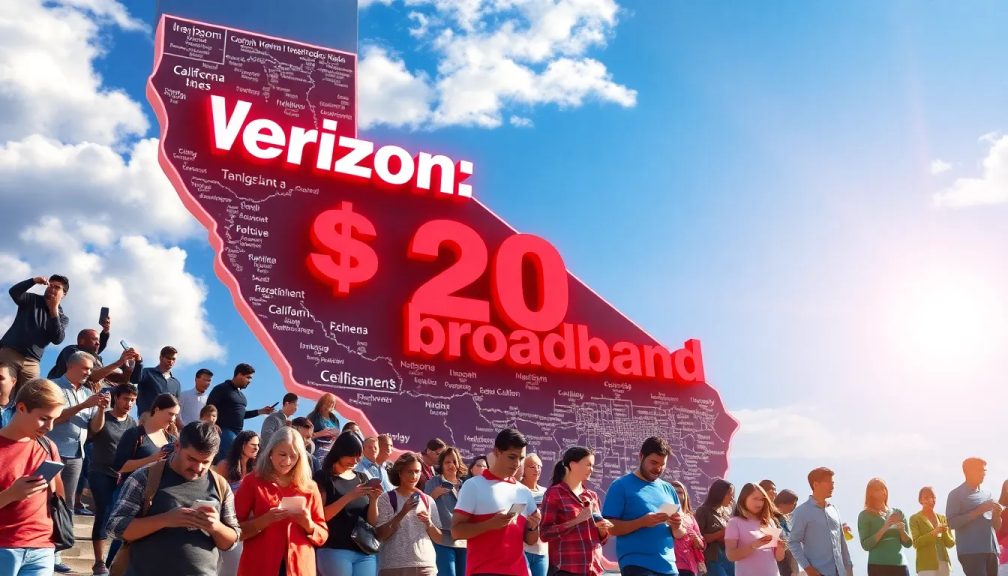Verizon offers $20 broadband in California for merger approval

In a landscape marked by rapid technological advancements and shifting regulatory frameworks, Verizon is navigating its way through the complex terrain of state approvals essential for its merger with Frontier Communications. This acquisition, estimated at $20 billion, represents not just a significant financial commitment but also a strategic move aimed at expanding Verizon's broadband services across multiple states, particularly in California. The stakes are high, as the approval hinges on a variety of factors including compliance with local laws, diversity initiatives, and the provision of affordable internet services.
Verizon's strategy to secure merger approvals
Verizon is methodically gathering necessary approvals from state governments to facilitate its acquisition of Frontier. This process involves a multifaceted approach that considers both regulatory compliance and community impact. The company's Chief Financial Officer, Anthony Skiadas, recently indicated that the firm is making steady progress, having already received regulatory endorsements from eight states along with the Federal Communications Commission (FCC) and the Department of Justice (DOJ).
To bolster their merger prospects, Verizon has been proactive in engaging with state regulatory agencies, highlighting their commitment to low-income broadband programs. For instance, in Pennsylvania, the Public Utility Commission approved a settlement that extends discounted service plans to Frontier's customer base. This plan, branded as "Verizon Forward", aims to provide affordable internet access to vulnerable communities.
Affordable internet initiatives and compliance challenges
Verizon's commitment to affordable broadband is evident through its efforts to expand the Verizon Forward program in various states. This program offers plans that can drop to as low as $20 when combined with federal assistance programs like Lifeline, designed to support low-income households. The Pennsylvania agreement is particularly notable as it ensures that any enhanced commitments made by Verizon in other states will also benefit customers in Pennsylvania.
- Access to broadband services for low-income households.
- Discounted plans as low as $20 per month.
- Collaboration with state regulators to maintain compliance.
- Commitment to improving infrastructure in underserved areas.
However, the merger faces hurdles, particularly regarding compliance with California's stringent diversity, equity, and inclusion (DEI) policies. The California Public Utilities Commission (CPUC) has raised concerns about how Verizon will meet state regulations in the absence of established DEI programs, which were a point of contention during negotiations with the FCC. Verizon's decision to eliminate DEI initiatives was a strategic move to secure federal approval, but it has raised alarms in California, where such diversity programs are integral to regulatory compliance.
The implications of regulatory decisions
The disagreement between California regulators and the Trump administration around DEI policies adds another layer of complexity to Verizon's acquisition strategy. California legislators view the absence of robust DEI initiatives as detrimental to the comprehensive representation and hiring practices within the telecommunications sector. CPUC officials have expressed concerns that without these programs, Verizon may struggle to meet local hiring requirements for women, minorities, disabled veterans, and LGBTQ+ individuals.
As noted by CPUC Commissioner Darcie L. Houck, "Without these commitments, we risk undermining the progress made towards equitable access to resources and opportunities in telecommunications." This statement highlights the ongoing tension between federal and state regulatory frameworks, demonstrating how Verizon's corporate strategies must navigate these competing demands.
Financial aspects of the merger
The financial implications of Verizon's acquisition are substantial, as the company will not only pay $9.6 billion for Frontier but also assume over $10 billion in existing debt. This significant financial investment underscores Verizon's commitment to expanding its market presence and enhancing its service offerings. Frontier currently serves around 3 million customers across 25 states, making it a valuable asset for Verizon's growth strategy.
To ensure the success of this merger, Verizon's plans include comprehensive audits of Frontier's existing infrastructure, which consists of both copper and fiber networks. These audits are critical for identifying and resolving any existing issues that could impact service quality. The merger is poised to facilitate significant investment in network upgrades, with an emphasis on improving service reliability and expanding access to high-speed internet in underserved areas.
Looking ahead: the future of broadband in California
As Verizon continues to seek approval for its merger with Frontier, the company is also focused on the long-term implications of its broadband initiatives in California. The promise of affordable, reliable internet access is a crucial factor that could potentially sway public opinion and regulatory decisions. The goal is not only to fulfill state requirements but also to position Verizon as a leader in the broadband space, particularly in a state known for its tech innovation and digital demands.
In this context, California's potential to become the first state to provide universal free internet access is an ambitious vision outlined by CPUC officials. "We are committed to exploring every avenue to ensure that all Californians have access to the internet, regardless of their socioeconomic status," stated CPUC President Alice Reynolds. This vision aligns with broader national trends aimed at closing the digital divide and ensuring equitable access to essential services.
As the regulatory landscape continues to evolve, Verizon's ability to adapt its strategies will be vital in determining the success of this merger. The interplay between federal mandates and state-level requirements will shape the future of broadband services and will ultimately influence how effectively underserved communities can access the benefits of digital technology.
For more insights on Verizon's ongoing merger discussions and its implications for the broadband market, you can check out this relevant video:




Leave a Reply